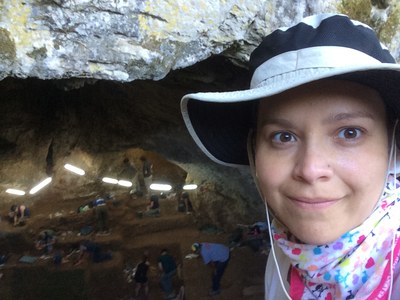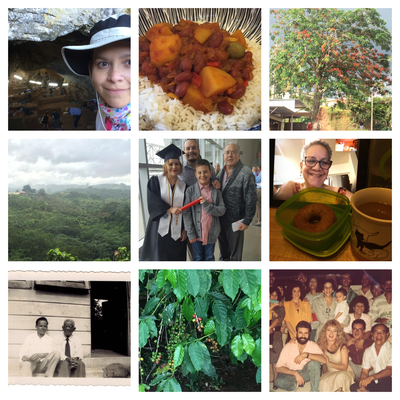Student Spotlight October-November 2021
Michelle Montalvo-Jourdan


Michelle Montalvo-Jourdan works in the Graduate School as the program coordinator for student recruitment, success, and retention. She is also a current 2nd yr. graduate student studying Anthropology, with a focus on environmental sustainability and food sovereignty.
She began her professional career at U of L in 2017 with Campus Housing as Assignments Coordinator. Outside of school and work, Michelle likes to be in nature, garden, urban forage, do yoga, read true crime novels, and make maps. And she lives by the motto “Honor the journey and reflect on the experiences, be kind to all including yourself, live a life of compassion, peace starts on our plates.”
Q: Describe your educational background (include undergrad):
A: I started my undergraduate career at the University of Florida in Microbiology and Cell Sciences and concluded that was not the track I wanted to follow. I took some exploratory courses and that’s when I happened upon Anthropology. My family moved to Kentucky from Florida after my father retired from the Air Force, and before deciding on a new college, I took time to get settled in a new state and school. I took courses at Jefferson County Community College while working full time, where I completed my AA with a concentration in Anthropology and Social Sciences. I then transferred to The University of Louisville where I applied to the Anthropology Department. During my undergraduate here, I took diverse courses dealing with environmental issues, human land use interactions, and sustainability as well as focusing on archaeology and forensics sciences. I graduated with my BA in Anthropology in 2016. After graduation, I went to field school in Portugal under the supervision of Dr. Jonathan Haws at his research site in Lapa do Picareiro. Upon my return, I decided to take 2 years of Post Baccalaureate studies in our Department of Geographic and Environmental Sciences. I used this time to refine my research techniques and focused on environmental sciences and assess and illustrate environmental impacts. I felt ready to start graduate school and applied to our Anthropology Department in Spring 2020. During graduate school, I have concentrated on Environmental Anthropology topics like food sovereignty, human land use interactions, and environmental degradation issues.
Q: What brought you to the University of Louisville?
A: As an underrepresented minority, I worried about fitting in, but the school and the professors made me feel welcome and supported. My mentors and professors in the Anthropology and Geographic and Environmental Sciences Departments were so encouraging when I expressed my desire to start on my graduate journey that I knew I had truly found a great support system that would provide me with the tools to build on the great foundation they had already helped me establish.
Q: Specific areas of research (how you chose this research, why it interested you):
A: I focus on human-land interactions and the benefits of agroecological farming practices and soil remediation methods. My research explores the relationship between people and their physical environment. Through it, I try to understand the roles that power and privilege play in prolonging systems of unsustainable agricultural practices that proliferate soil and water degradation and perpetuate systems of oppression on marginalized communities.
Q: How would you describe your area of study/ specific research to your grandmother?
A: My grandmother's love of cultivating the land, caring for it, loving it, and being supported back by the love you poured into it helped me to see the importance of having sustainable methods in our agricultural approaches. Through her, I learned about our culture and treatment of the land through our food. As we prepared traditional dishes together, she would tell me the story of the recipes and to which culture on the island to attribute it to. Her passion for teaching the old ways helped me understand the relationship that small farmers (Jibaritos as we know them) played in supporting the islands: food sovereignty movement, our authenticity, and resourcefulness.
Q: What made you go into this field of study?
A: During my last semester of undergraduate, I took an Anthropology of Water class. The class helped solidify my research interest by showing me how I could use my anthropological and interdisciplinary training as a way to understand human-environment interactions.
Q: Awards, honors, publications:
- Lambda Alpha National Anthropology Honor Society
- Alpha Kappa Delta International Sociology Honors Society of Sociology
- Directors Award Campus Housing University of Louisville 2017-2018
- Kentucky Association of Housing Officers (KAHO) Service Award 2018-2019
Q: How do you think this advanced degree will change your role in society?
A: When I think of my role in society, I think of my grandfather and his life of service. Because of his example, my drive has always been to make a positive impact on people’s lives. I hope that my research can help support marginalized communities to tell their story.
Q: Long term goals/ aspirations:
A: I would love to work in a profession where I get to do research and allow it to inform policy decisions.
Q: What accomplishment, academic or otherwise, are you most proud of?
A: Completing my BA has been my most proud moment thus far. I have been very fortunate as a BIPOC to have a fantastic mentoring network of professionals and professors who encouraged and reassured me of my strength and courage when feelings of impostorism set in.
Q: What has been your favorite part of the graduate school experience at UofL?
A: PLAN programming has been my favorite part because it not only supports you as a graduate student, but it helps you flourish by providing an amazing holistic tools box for approaching your professional, or academic career.
Q: What do you feel is the greatest challenge that graduate students face and how have you dealt with this challenge?
A: The greatest challenge for graduate students in my eyes is Time management. I have been very intentional at the beginning of every year and semester in assessing and planning my goals. A great plan can help you: keep urgencies at bay, manage graduate anxiety, improve mental health and overall wellbeing, and allow you to use your precious time efficiently.
Q: Family life:
A: Family is very important to me. Their support, guidance, and mentoring have been crucial to my foundation and success. I LOVE Mi Familia!
Q: You refer to your identity as Borica, can you tell us what that means and how it may be different from or similar to the terms Hispanic or Latinx?
A: Identifying as Boricua is very important to me because I was born and raised on the island. When I use the term Boricua it makes me feel like I am identifying with my roots and honor my ancestors. To me, it’s more than just being Puerto Rican because “my heart is home.” My ancestors are African, French, and Italian, but I am white presenting so people don’t see all of that. The term Boricua allows me to be very intentional about being a Caribbean Islander, however, the term is not meant to be elitist.
Q: How did you end up in Louisville?
A: My dad was an emergency room physician who joined the Air Force and his first assignment was in Puerto Rico. Our family was then stationed in the states and went to Niceville, Florida in 1989. In 1997 my dad joined the reserves and was stationed in Louisville while he worked at Audobon Hospital. I call Louisville home. I really enjoyed moving here and experiencing all of the seasons. I remember seeing snow for the first time at 19 and playing in it like I was a little kid!
Q: What are some traditions, holidays, or special celebrations that you remember growing up or are currently a part of your culture?
A: The Boricua culture is very warm and loving. We find any excuse to gather and have parties and it’s not a party without music. Our music has lots of African roots and we are given small instruments as children. Music is another way to pass down traditions and our culture. Christmas is very big in my culture, around this time we love to prank our family members by doing the equivalent of caroling in America at odd/late hours of the night and in large groups. We have lots of traditional meals that have African roots. These meals started as cheap ways to feed lots of people and are now traditions.
Q: Are there any resources in Louisville that you have found helpful or helpful to others who identify as Boricua?
A: I haven’t found any in Louisville, or Kentucky in general. Right now the only connections to the culture and tradition have been my family, ValueMarket, and the Cuban supermarket. These places allow me to get what I need to feel connected. A large portion of Puerto Ricans moved to Louisville from Lorain, Ohio years ago when the Ford plant up there closed. I have to give credit to the UofL Latinx faculty and staff because they have been very intentional about getting us together. This year I have been more intentional about attending events and practicing my Spanish with them.
Q: What are your favorite aspects of the Boricua culture?
A: I love all of the different cultures that make me Boricua. It is very African-centric and we honor those African roots and our heritage. I love the ties to land and places and how we really honor nature. I think we are very intentional about water quality, soil health, and cultivating the land. Environmental racism is very important to me and I attribute this to my upbringing.
Fun Facts
A talent you have always wanted: I’ve always wanted to be proficient at the Potter’s Wheel
Favorite book: La Carreta by René Marqués
Favorite quote: “Darkness cannot drive out darkness; only light can do that. Hate cannot drive out hate; only love can do that”
Role Model: My grandfather Dr. Carlos Montalvo-Vega and Michelle Obama
Favorite Vacation Destination: Anywhere where I can be one with nature.
If you weren’t in graduate school, what would you be doing now? I would probably be working in water resource management or doing cartography.
